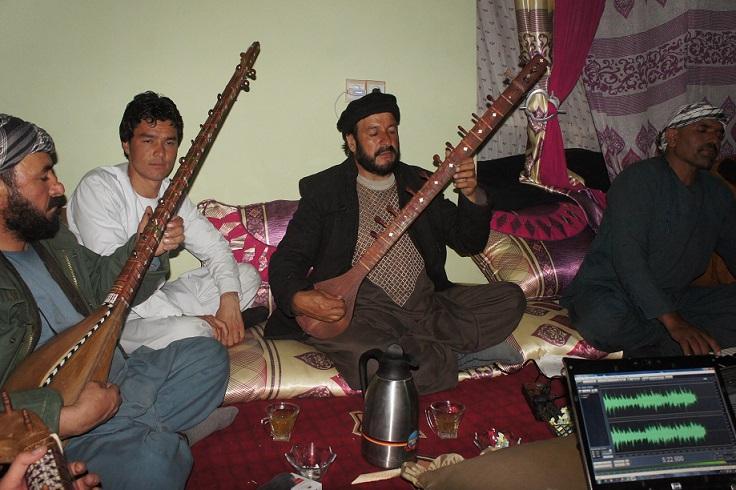FEROZKOH (Pajhwok): Homegrown music that once enthralled audiences during festivals and other happy events in western Ghor province has been on the decline, local singers say.
Artists and cultural activists criticize the government for having ignored the local music which gives identity to every province. They say the traditional music in Ghor province has long been ignored and call for efforts at reviving the music.
They also complain traditional musical instruments earlier used in festivals have been replaced by modern musical instruments, which are not as pleasant as the traditional items.
Ghulam Sakhi Jalili, a local music artist who has 25 years of experience in music, said: “The traditional music of Ghor is part of our culture and loved by people but now it is vanishing.”
Jalili claimed the lack of attention on the part of central and provincial governments towards local culture and traditions allowed external cultures to greatly influence local culture and music and cause them to disappear.
“People in the past would listen local music, they respected local artists who entertained audiences in every festival and gathering, but now in most festivals Indian, Iranian and American music is played.”
He said local music was being disappeared and replaced by external music because of government’s negligence. Local artists had tried to keep the local music alive even at the cost of their blood, he added.
He demanded immediate attention to the revival of local music and feared if the situation remained the same; it was not far when local culture and music — the ideological asset — would disappear.
Mohammad Yasin Kahzad, 50, a music artist, said he had participated in hundreds of concerts playing traditional musical instruments since adulthood.
He said local musical instruments in Ghor traced back to the time of Ghurid Empire and were used in the province since the time of the Persian Empire.
He named Bai Mohammad Sodae, Azem Khajagani and Abdul Baqi as renowned singers in the western zone of the country. People from other parts of the country also invited them for performance to other provinces.
Kahzad, worried about the fate of local music, recalled: “During the Taliban regime, I was beaten and tortured for being a musician, but I did not quit. During Dr. Najibullah’s regime some work for music promotion was done but currently no attention is paid to local music.”
Meanwhile, youth and cultural activists in Ghor termed the disappearing local music as a huge setback to the culture and art of the society.
They said the government should not keep mum over the disappearing of local music and instead should strive for its revival and promotion.
Marouf Sayedi, a youth, said: “Music, art and cultural festivities represent a province’s culture and history, so forgetting it is forgetting cultural values.”
Meanwhile, women and girls in Ghor also expressed concern over the replacement of local music by foreign.
Nigar, one of them, said people particularly women until few years back used Darya (tambourine) and Zirbaghali (a goblet-shaped hand drum) in their happy events.
“But nowadays in current events women play foreign music such as Iranian, Indian and other countries,” the 50 years old said, wishing the return of old melodies. She said local Ghor music has special quality and joy.
“When I was a young girl, we would enjoy playing Darya and Zirbaghali and signing with music in wedding parties, but now Iranian music is played in such parties,” she said.
Besides other people, music sellers in Firozkoh city, the capital of Ghor, also complained about the issue.
Abdul Wahid, 60, who sells cassettes on roadsides in Firozkoh city for the past 20 years, told Pajhwok that many people would purchase cassettes of local music from him few years back, but now the number of buyers had declined over the years.
He said local artists would make most of music instruments used in Ghor in the past, but this art also weakened with the passage of time.
“Music artists would approach Mohammad Ali, a person in Tiora district of Ghor, for making wooden musical instruments, these instruments were sold on high prices,” he remembered.
About his business, Wahid said: “There are no sales, our business is very weak, no one buys cassettes, our business was good few years ago, I would record songs of local singers in the past and people would buy that, but now no one buys these cassettes.”
On the other hand, Ghor officials also confirmed local music had weakened. Ghor Governor Ghulam Naser Khazay confirmed “foreign cultural invasion” caused people to rarely listen to local music.
But he said his administration had taken steps for strengthening artistic and cultural activities and had created a literary association of poets and writers.
“Unfortunately the music sector is paid less attention because it is a traditional society,” he said.
Khazay accused the Ministry of Information and Culture of negligence in promotion of culture and art and said the ministry did not allocate enough budget to its provincial departments.
Fakhruddin Aryapor, Ghor information and culture director, admitted lack of enough budget was behind little attention to promotion of local music.
“Unfortunately local music did not improve as one should expect and the reason is our youth have turned to western and urban music,” he said.
“The influx of foreign media that spreads western music and lack of support and budget are to blame for a weakened local culture”, he said.
nh/mds/ma
Views: 9








GET IN TOUCH
NEWSLETTER
SUGGEST A STORY
PAJHWOK MOBILE APP